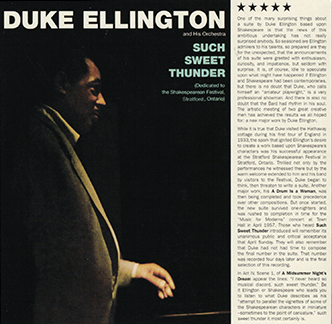Play On!
And Some Find Greatness Between the Lines
Conceived by Sheldon Epps, Book by Cheryl L. West, Music by Duke Ellington
Signature Theatre, THE MAX, Arlington, Virginia
Wednesday, October 1, 2025, Table K–4 (Front floor center)
Directed by Lili-Anne Brown, Music Direction by Jermaine Hill, Choreographed by Breon Arzell
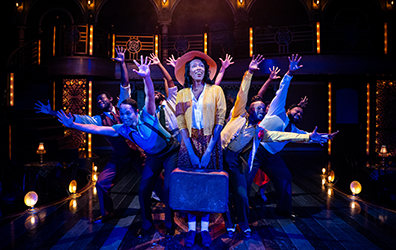
Above, Vy (Jalisa Williams) rides the A Train into Harlem upon her arrival from Mississippi in Signature Theatre's production of Play On! Dancing in the ensemble behind her are Bryan Archibald, Montel B. Butler, Ciara Hargrove, Divine Iweha, Vaughn Ryan Midder, Kalen Robinson, and Sean Walton. Below, Duke (Greg Watkins, left) and the disguised Vy play one of her songs with ensemble members as the band. Photos by Daniel Rader.
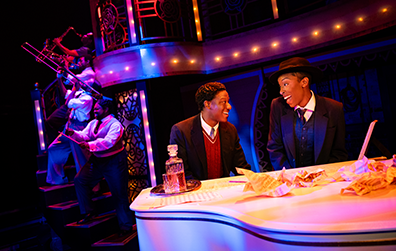
William Shakespeare and Duke Ellington were collaborating long before Sheldon Epps and Cheryl L. West brought them together for Play On!, a musical about a love triangle involving a Duke, a regal Lady, and a woman disguised as a man as their go-between messenger. England’s great 16th century playwright and 20th century America’s premier jazz musician first collaborated in 1957 with Such Sweet Thunder, a suite of 12 compositions by Ellington and his arranger, Billy Strayhorn, each tagged to a Shakespeare character. All great stuff.
Almost 40 years later, Play On! premiered at the Old Globe Theatre in San Diego, California, before moving to Broadway for a three-Tony-nomination run. The play transplants Shakespeare’s Twelfth Night to the Harlem Renaissance (1920s–1930s) with a score comprising Ellington tunes, including such lasting hits as “It Don’t Mean a Thing (If It Ain’t Got That Swing),” “Don’t Get Around Much Anymore,” “I Got It Bad and That Ain’t Good,” “I Ain’t Got Nothing but the Blues,” and “Prelude to a Kiss.” All fun stuff.
Especially in the hands of director Lili-Anne Brown and the feet, legs, and voices—oh! the voices—of the cast performing the musical at Signature Theatre in Arlington, Virginia, which closed out a mostly sold-out run last weekend. Maybe for Shakespeare purists it won’t mean a thing if it ain’t Bard writing, but aside from being fun stuff and great Ellington music, Play On! captures and even enhances some of the universal humanism Twelfth Night explores.
Much of the 2½-hour play, including a 15-minute intermission, is set in a nightclub with a portion of the ticketed audience serving as nightclub clientele at small tables around a deep thrust stage. Scenic Designer Dan Conway extends that stage from a two-tier set, with a jazz band on the upper floor. A staircase descends on the left, and the Cotton Club's backdrop is the Currier and Ives lithograph “A Home on the Mississippi” with horse-pulled carriages on a riverside path past a plantation mansion, Spanish moss-covered trees, and a steamboat coming down the river. Lighting Designer Jason Lynch transitions us from expositionary scenes to the nightclub environment to introspective moments, and Costume Designer Samantha C. Jones dresses the cast in authentic ’30s Harlem style.
Play On! is not so much an adaptation of Shakespeare's plot as a re-utilization of the tropes he uses.
- The central character, Vy (Jalisa Williams), is a young woman from Mississippi who arrives not by shipwreck but by the A Train dropping her off in Harlem. Choreographer Breon Arzell, incorporating athletic period dance steps, turns the subway journey into an ensemble number in which Vy’s suitcase joins in the fun. An adept songwriter according to family opinion, Vy is visiting her Uncle Jester to gain entry into the Harlem music scene and present her songs to the famous, fabulous Duke. However, women are not considered legitimate songwriters in Harlem, so, Vy asserts, “I’ll have to make myself a man,” and her uncle coaches her on how she's got to be a rug cutter.
- There is a Duke by name (Greg Watkins) but not by title, albeit regal in the sense of his influence and artistic power in the Harlem music scene. Ostensibly a fictional channeling of Ellington, Duke is in a funk because he let a song go out of his heart, an allegory for his now ex-girlfriend, prima donna singer Lady Liv (Awa Sal Secka). Duke likes the disguised Vy’s song sample and enlists her to use it in courting Lady Liv for him.
- Lady Liv is in a mood indigo, but Vy’s song and her performance of it puts a charge in Lady Liv. “A man like that can take my soul straight to hell,” she says (not sings) of the disguised Vy: “He can wear a woman out in a good way.”
- Lady Liv's entourage includes Miss Mary (Kanysha Williams) as her personal maid; Miss Mary’s husband, the large, loudmouth, callous band leader Sweets (Derrick D. Truby Jr.); and an uptight, upright, sour club manager called Rev (Chuckie Benson).
- Crushing on Lady Liv—and wondering why she doesn't know he cares for her—Rev is this show’s Malvolio. In a nice nod to the original character, whom Twelfth Night’s Maria calls a “kind of Puritan,” Rev’s own puritanical theology is out of place for a 1930s Harlem nightclub. Thus, Miss Mary carries Maria’s insult a significant step further, telling Rev, “If you were directing traffic in heaven, Lady Liv would turn around and go straight to hell.” As with the trick on Malvolio in Twelfth Night, Mary, Sweets, and Jester use Rev’s crush as the basis for their prank, coaching him into courting Lady Liv as a street-savvy, scatting hipster. Instead of cross-gartered yellow stockings, Rev comes to Lady Liv wearing a yellow-checkered zoot suit and wide-brimmed, feather-adorned hat.
- When Jester (Wesley J. Barnes) escorts Vy to the club to visit Lady Liv, Rev greets him with, “You look like you have some purpose other than playing the fool.” Yes, Jester is this play's Feste, with the agile wit of Shakespeare's fool metaphorically represented in Barnes's extraordinary tap-dancing feet (Barnes is also the company's dance captain).
- Play On! has no Sir Andrew Aguecheek representation, but Sweets and Jester replicate Twelfth Night’s scene of drunken revelry. After both have been jilted by their women, they sit at one of the tables in front of the stage singing about rocks in their bed while directly interacting with the audience around them. The drunker they get, the worse their dancing (skillful hilarity) but the better their singing (inspiring vocals).
Vy has no twin brother, so Play On! is absent Twelfth Night's primary plot device. With no male look-alike to subrogate Lady Liv's lust for Vy, the nightclub diva finds her ultimate from-the-heart pairing in another character. I won't say who for spoiler purposes, except that it adheres to a theme-line West develops from Shakespeare's ploy of having shocks to the heart expose his characters to self-discovery.
West works Twelfth Night’s famous quotes into her script with a cleverness sure to inspire the audience to nod knowingly in snobbish approval. Where Shakespeare starts his play with Orlando saying, “If music be the food of love, play on,” Play On! starts with Jester pointing to the balcony and saying, “Hey drummer: play on!” and moves into his breathtaking, show-opening tap-dancing solo. The “some achieve greatness…” speech, which in Shakespeare’s play is part of the planted letter that gulls Malvolio, becomes the heart of Duke’s speech encouraging Vy to not give up songwriting. He also offers that they should collaborate, noting how good she is at establishing great melodies and fun lyrics; but when the song needs the right "thrust, that's where I come in." Though Duke thinks he’s talking to a man, this conversation about song composition is so full of sexual inuendo one can’t help thinking—including Vy—that he’s propositioning her, similar to Orsino's seeming homosexual tugs as his relationship with Viola's Cesario deepens in Twelfth Night.
Play On!’s relationship to Twelfth Night is much more complex than Easter egg moments. Rather than transplanting Shakespeare's plot from Renaissance Illyria to the Harlem Renaissance, West’s focus is to expand on human truths Shakespeare sometimes only hints at in Twelfth Night.
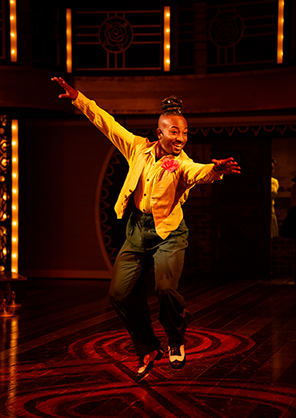
Above, tap-dancing wizard Wesley J. Barnes plays Jester. Below, Awa Sal Secka as Lady Liv performs in her nightclub in the Signature Theatre production of Play On! Photos by Daniel Rader.
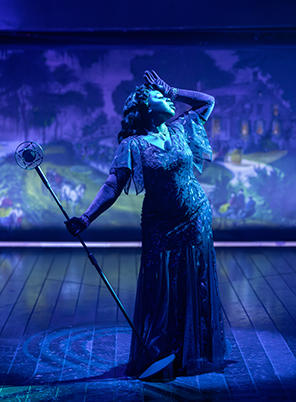
For example, Shakespeare has Duke Orsino speak these blatantly sexist lines: "There is no woman's sides can bide the beating of so strong a passion as love doth give my heart; no woman's heart so big to hold so much—they lack retention." Play On!'s Duke applies a similar decree to why he believes women can never be songwriters. "Women, incredible creatures though they may be, are too shallow to write songs," he tells Vy.
"You're wrong," she says.
"The Duke is never wrong," Duke replies, not just arrogantly but confidently, as well, because he doesn't know he's talking to a woman. He soon comes to learn, in a prelude to a kiss, that the rug cutter is a woman whom he already knows has written great songs, including at least two of his biggest hits (if he were the real Duke Ellington). Depending on how the actor plays Orsino, the Duke of Illyria has a similar self-realized come-uppance upon learning Cesario is a woman, who's sides can more than match the beating of his heart.
This is not a trivial transmutation, for the Illyrian Duke's over-exuberant self-love approach to romance is a shared aspect of the Harlem Duke's commercial-based misogyny. Perhaps Orsino’s pursuit of Olivia likewise is commercial-based misogyny: his pronunciations of his love are so shallow compared to the genuine passion he expresses toward Viola while believing she’s a boy. Makes you wonder why Vy still wants Duke and Viola still wants Orsino. In Vy’s case, at least, Duke is a brilliant composer she’s long admired, good looking in person and not just in his photographs she's collected, and a heaven-blessed soulful singer. That’s all Watkins’s doing. His Duke is quite the pianist, too, but production credit for that talent goes to Brian P. Whitted on the keys and leading the band up in the balcony.
Shakespeare provides no explanation from Olivia for her apparent distaste for Orsino except his stalker-like persistence. Such persistence, though, is often an attribute in fictional and factual tales of romance, including Shakespeare's, and Play On! even defends that trope. "I wish that insufferable fool would just give up," Lady Liv tells Vy.
"Then he really would be a fool," replies Vy.
In Twelfth Night, Sir Toby Belch offers the only hint of Olivia’s motive: she will, he says, “not match above her degree, neither in estate, years nor wit—I have heard her swear't." That may be the truth and would be an indication that Olivia’s resisting Orsino’s version of commercial-based misogyny. The statement just as likely could be Belch’s gulling Sir Andrew. In Play On!, Lady Liv gives a more blunt reckoning of her feelings about Duke when the disguised Vy insists that Duke loves her: "He loved the way I looked on his arm," Lady Liv replies. Given Shakespeare's almost uncompromising portrayal of Orsino's vanity, Lady Liv could be talking about either play’s Duke.
West doesn't let Lady Liv off the hook, either. The script extends a subtle point in Shakespeare’s cross-gartered yellow stockings scene often glanced over in Twelfth Night productions I've seen. Olivia, excessively anxious about her feelings for the disguised Viola, asks Maria to fetch Malvolio because "He is sad and civil, and suits well for a servant with my fortunes." Malvolia arrives elaborately overdressed and openly trying to seduce her. Olivia, worried he's gone insane, unwittingly licenses Malvolio’s pranksters to tend to her steward.
In Play On!, Lady Liv is royally pissed upon discovering the disguised Vy is working for Duke. This annoyance she extends to her entire entourage, and she asks Miss Mary to fetch Rev, whose steady countenance can right her foundering state of affairs. Rev arrives elaborately overdressed and intent on impressing her with his supreme cool and asserting he's beginning to see the light in the kind of man she yearns for. The point of the pranksters’ prank is that Rev is impossible to transition into a street-suave, scatting hipster and makes for the musical comedy highlight of the show, combining Benson's over-sultry vocals with a pathetic bit of scat while marring the ensemble’s clever dance steps with his clever missteps. It’s a brilliantly staged gambit of using Benson’s obvious musical talents to create contextually and visually inspired laughs. Through it all, Secka's Lady Liv stands in seething bewilderment, which further emphasizes the scene’s silliness.
Benson is physically adept at playing the comic puritan. He melts in ecstasy over the sweaty handkerchief Lady Liv hands him to dispose of. He vibrates his every fiber when she perfunctorily touches him. The intensity of her fury now shocks Rev, and as the prank is revealed to him, Benson makes genuine how bad Rev’s got it with his scorched heart and crushed soul, and we totally empathize how that ain't good.
Unlike Olivia, Lady Liv is aware of Rev's crush on her and, prior to his zoot suit fiasco, has played his yearning to her advantage. Nevertheless, the Olivia-Lady Liv parallels represent what could be considered a missed opportunity for Shakespeare. He turns the Malvolio subplot into more, increasingly tiresome comic set pieces leading up to a frustratingly enigmatic ending for the character. In her script, West merges the Malvolio subplot into the musical's overarching theme of finding one's true self. This leads to a satisfyingly sweet ending across the cast for Play On! as it's subplot diverges from that of Twelfth Night.
Okay, you can accuse me of over-analyzing this pure-fun piece of musical theater. It’s the singing and dancing that matters most in a show of this sort. On the latter, the marvelous choreography went beyond the ensemble set pieces to the characters’ physical interactions with each other. As for the singing, picking a favorite is impossible (and kudos to sound designer Eric Norris for making every character sound crystal clear, and Luther Henderson’s fulfilling orchestrations). Picking favorite moments, however, is easy. One came as Williams' Miss Mary coached Rev how to scat, and Williams let loose a sequence of electrifying gibberish that would have made Ella Fitzgerald stand in awe and the Manhattan Transfer slink away as collectively unworthy.
The other vocal highlight turned exceptional vocal talent into subtle comic gold leading into an Oh, my! The second half of the play opens with Lady Liv performing in the club singing “Black Butterfly.” She’s dressed in a gorgeous black gown with a shoulder cape that she spreads to represent butterfly wings. You could see the joke coming, yet it still earns a laugh because the source of the comedy is in Lady Liv's can-you-believe-I'm-doing-this-crap expression. Likewise, Secka's singing is technically perfect, but Lady Liv is totally disinterested, an astounding comic visual of hearing a singer letting loose her tremendous vocal chops while noticeably mailing it in. Lady Liv stops the song, complains she’s not in the mood, and then rules the mood of the room by launching into “I Ain’t Got Nothing but the Blues.” This is the 10-plus-score vocal performance of the night, not just in Secka’s scintillating management of melody and scales but also singing with deep-soul emotion while remaining fully in character: for as Secka ends the song, leaving many of us awestruck and some rising to a standing ovation, Lady Liv angrily storms off the stage.
The subtle throughline of Twelfth Night is how the characters find their true selves through Viola outwardly changing who she really is. Play On! is a bit more straightforward on this point. “Strange how people feel they have to change when they only have to find their true selves,” Lady Liv says. So, it's fair to say this musical is kind of a Bard thing and has that Duke swing. It’s fun stuff, and great stuff, too.
Eric Minton
October 11, 2025
Comment: e-mail editorial@shakespeareances.com
Start a discussion in the Bardroom




 Find additional Shakespeareances
Find additional Shakespeareances